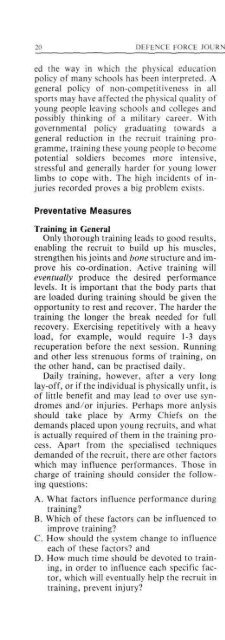ISSUE 75 : Mar/Apr - 1989 - Australian Defence Force Journal
ISSUE 75 : Mar/Apr - 1989 - Australian Defence Force Journal
ISSUE 75 : Mar/Apr - 1989 - Australian Defence Force Journal
- No tags were found...
You also want an ePaper? Increase the reach of your titles
YUMPU automatically turns print PDFs into web optimized ePapers that Google loves.
40 DEFENCE FORCE JOURNAL No. <strong>75</strong> <strong>Mar</strong>ch/<strong>Apr</strong>il 89Levels of Knowledge and InformationRequirementsThe two research studies discovered awidespread lack of knowledge and understandingin the general population about subjectssuch as strategic issues, the ADF, the Reserves,employment in the <strong>Force</strong>s and defenceindustry.While the majority of respondents feltthemselves to be ill-informed on <strong>Defence</strong> issues,they self-assessed this level of knowledge to be"about average". At the same time, at leasthalf of all the people surveyed stated that theywould like more information on various<strong>Defence</strong> issues such as allies, strategies, defencespending and the role of the ADF.In terms of preferred sources of information,an overwhelming proportion of respondentsfelt that they would go directly to ADF promotionsfor reliable and credible information. Thisfinding correlates with the favourable attitudeswhich the majority of the community holdtowards service personnel.Of all respondents, those with service acquaintanceswere found to be the best informed,most interested and most concerned groupsin the community. The ANOP researchers commentedthat;"Servicemen and women have fairlywidespread contact with the community andour results suggest that they convey afavourable view of <strong>Defence</strong> <strong>Force</strong> life . . .Nevertheless, considering the extent of theircontact with the community, and the community'sgenerally low level of knowledgeand understanding of <strong>Defence</strong> issues, theytend to be a rather 'silent service', and anunder-utilized form of communications andimage building." 5The conclusions of the University ofWollongong study confirmed these views andemphasised the importance of providing relevantand interesting information to the public:"There is sufficient evidence that the<strong>Australian</strong> public does have in interest in,and opinion of the ADF and <strong>Defence</strong>policies. Unless the information supplied tothe public is accurate and of interest to them,they will continue to form and maintain opinionsthat are perhaps based onmisinformation."'Complex StandpointsIn many ways, public opinion research canpose as many questions as it answers. Whereissues such as alliances and strategies are concerned,the state of play with internationalpolitics can have marked effects on the findings.Precisely because they are complex issues,it is necessary to analyse related public opinionin greater depth.The ANOP research has allowed for thetracking of public opionion on specific issuesover the last decade. It has identified somesignificant shifts over this period. One of themajor trends evident from the analysis is that aremarkable shift has occurred in relation to the<strong>Defence</strong> <strong>Force</strong> and its capability, which links inwith the increased community confidence inAustralia's defence capacity.This level of confidence also needs to be interpretedin the context of public perceptions ofthreats to Australia. This correlation can beseen in the changing attitudes of young peopleover recent years. When young people weremost concerned about the possibility of anuclear war, they tended to believe that they,and Australia, were powerless. At this timethere was a corresponding crop in the level ofimportance placed on having a permanent<strong>Defence</strong> <strong>Force</strong> and its perceived effectiveness."The perception of threat among young peoplehas dropped from 66% (believing that externalthreat was likely) in 1980 to 38% in 1987. Inturn, their level of support for the ADF hasrisen significantly.These are fairly straight-forward links. Thereare, however, far more complex attitudinalstances which impact upon people's overallconceptions of <strong>Defence</strong> issues.The University of Wollongong study revealedthat many respondents held critical opinions ofthe Australia/US Alliance.For example;— A large proportion of respondents feltthat the alliance encouraged the threat of attackto Australia,— A majority believed that Australia reliestoo heavily on the alliance for defence,— A majority considered it true thatAustrlaia's interests are often overlooked infavour of foreign interests.On the face of it, these findings appear to indicatea significant groundswell of opinionagainst the alliance. Conversely, the ANOPresearch found that the <strong>Defence</strong> strategy

















